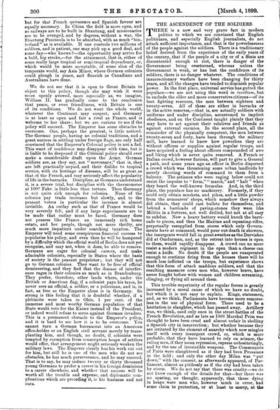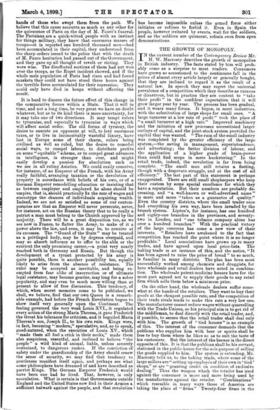THE ASCENDENCY OF THE SOLDIERS.
THERE is a new and very grave fact in modern politics to which we are convinced that English politicians, and especially English journalists, do not attach sufficient importance, and that is the powerlessness of the people against the soldiers. There is a traditionary belief derived from the experience of the early years of the century, that if the people of a city or of a State are discontented enough to riot, there is danger of the Government being overturned, whereas unless the Government is weak, or has lost the confidence of its soldiers, there is no danger whatever. The conditions of insurrectionary warfare have been changing for thirty years, and all the changes have tended to diminish popular power. In the first place, universal service has gutted the populace—we are not using this word in invidiam, but to exclude the older and more conservative citizens—of its best fighting resource, the men between eighteen and twenty-seven. All of these are either in barracks or in the active reserves,—that is, are actually soldiers with uniforms and under discipline, accustomed to implicit obedience, and on the Continent taught plainly that they may have to act against their relatives and friends as against external enemies. In the second place' all the remainder of the physically competent, the men between twenty-seven and forty, have been through the military mill, have learned to know how powerless they are without officers or supplies against regular troops, and have acquired a feeling about officers compounded of awe and liking which is never quite removed. A French or Italian crowd, however furious, will part to give a General a path, and some years ago an officer in Berlin dispersed a crowd which was threatening some urban landlords by merely shouting words of command to them from a balcony. The artisans who were raging below could not resist the impulse to "form," "march," and " halt " when they heard the well-known formulas. And, in the third place, the populace has no machinery. Formerly, if they could only obtain muskets, and pikes, and a little powder from the armourers' shops, which somehow they always did obtain, they could cast bullets for themselves, and behind a barricade of paving-stones they were like Militia in a fortress, not well drilled, but not at all easy to subdue. Now a heavy battery would knock the barri- cade to pieces, and then the Maxims and repeating-rifles, perpetually resupplied from stores which only Govern- ments have at command, would pour out death in showers, the insurgents would fall in great swathes as the Dervishes did at Omdurman, and, as the retreat into houses is open to them, would rapidly disappear. A crowd can no more resist a modern regiment in the open than a cheese can resist a knife. No doubt if the people are exasperated enough to continue firing from the houses there will be much loss inflicted on the troops, but experience shows that this form of attack maddens soldiers, and that the resulting massacre cows men who, however brave, have never fought before with women and children screaming, clinging, or flying all around them.
This terrible superiority of the regular forces is greatly increased by a moral cause of which we have no doubt, but which it is not easy to explain. Kings, statesmen, and, as we think, Parliaments have become more remorse- less in the use of physical force. There used to be a hesitation in slaughter, which has passed away. Artillery was, we think, used only once in the street-battles of the French Revolution, and as late as 1866 Marshal Prim was thought to have been cruel and almost unfair in shelling a Spanish city in insurrection; but whether because they are irritated by the element of anarchy which now mingles itself with every insurgent crowd, or, which is more probable, that they have learned to rely on science, the ruling men, if they mean repression, repress unhesitatingly, and by the use of irresistible weapons. The Communists of Paris were slaughtered as if they had been Prussians in the field ; and only the other day Milan was "put down," with the consent, as afterwards appeared, of Par- liament, almost as pitilessly as if the city had been taken by storm. We do not say that there was cruelty—we do not know enough of the details for that—but there was no sparing, no thought, apparently, that those dying in heaps were men who, however much in error, had some claim to protection, or at least to mercy, at the hands of those who swept them from the path We believe that this cause accounts as much as any other for the quiescence of Paris on the day of M. Faure's funeral. The Parisians are a quick-witted people with an instinct for things military, they knew that enormous masses of troops—it is reported one hundred thousand men—had been accumulated in their capital, they understood from the sharp orders issued to the police that with the death of M. Faure hesitation had passed out of the Government, and they gave up all thought of revolt or rioting. They were wise. The disaffected sections of them had not won over the troops, as the Roget incident showed, and if the whole male population of Paris had risen and had found muskets they could not have stood three hours against the terrible force accumulated for their repression. They could only have died in heaps without affecting the result.
It is hard to discern the future effect of this change in the comparative forces within a State. That it will in time, and not a long time, be very great we have no doubt whatever, but as to its kind there is more uncertainty, for it may take one of two directions. It may tempt rulers to tyrannise, and especially to tyrannise in ways which will affect social order. The old forms of tyranny, the desire to execute an opponent at will, to levy enormous taxes, or to live in inconceivably wasteful luxury, have lost in Europe some of their charm, rulers being civilised as well as ruled, but the desire to remodel social ways, to compel labour, to distribute profits on some "equitable" scheme, or to compel great advances in intelligence, is stronger than ever, and might easily develop a passion for absolutism such as we see in all ruling Asiatics. We could easily conceive, for instance, of an Emperor of the French, with his Army really faithful, arranging taxation or the devolution of property in accordance with beliefs of his own, or of a German Emperor remodelling education or insisting that as between employer and employed he alone should be umpire, that is, should practically fix the rate of wages and stereotype the chances of individuals acquiring wealth. Indeed, we are not so satisfied as some of our contem- poraries are that an Emperor will never persecute, never, for instance, act on the Russian theory that to be really a patriot a man must belong to the Church approved by the majority. There will be a great disposition too, as we see now in France, to flatter the Army, to make of it a power above the law, and even, it may be, to connive at its excesses. The "Guard of the State" may be treated as a privileged body, may be by degrees overpaid, and may so absorb influence as to offer to the able or the esurient the only promising career,—a point very nearly reached both in Germany and Russia. But though the development of a tyrant protected by his army is quite possible, there is another possibility too, equally likely to arise from the absence of resistance. The ruler may be accepted as inevitable, and being ex- empted from fear alike of insurrection or of ultimate legal resistance, may become gentler, may long for a sober popularity, and may even be much more willing than at present to allow of free discussion. This tendency, of which, when secret memoirs come to be published, we shall, we believe, find that our own Queen is a remark- able example, had before the French Revolution begun to show itself very generally upon the Continent. The feeling governed the very weak Louis XVI., it regulated every action of the strong Maria Theresa, it gave Frederick the Great his tolerance for criticism, and it beguiled Maria Theresa's son, Joseph II., to his own ruin. Kings were, in fact, becoming "modern," speculative, and, so to speak, good-natured, when the execution of Louis XV., which "made them all feel a crick in their necks," made them also suspicious, resentful, and inclined to believe "the people" a wild kind of animal, liable, unless severely restrained, to dangerous rushes. If the conviction of safety under the guardianship of the Army should renew the sense of security, we may find that tendency to gentleness manifest itself again, and perhaps see what some philosophers have dreamed of and have described as patriot Kings. The German Emperor Frederick would have been one had he lived. That, however, is only speculation. What is certain is that Governments outside England and the United States now find in their Armies a sufficient bulwark against the people, and that revolution has become impossible unless the armed force either initiates or refuses to forbid it. Even in Spain the people, however irritated by events, wait for the soldiers, and as the 'soldiers are quiescent, refrain even from open demonstrations.







































 Previous page
Previous page